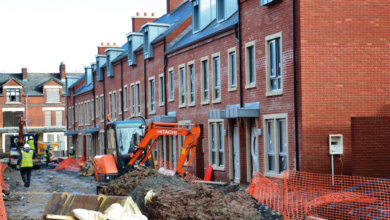Housing (Amendment) Bill fast-tracked

A Bill being fast-tracked through the Assembly to try and reverse the decision to reclassify housing associations that would hamper their ability to address the housing shortage in Northern Ireland, needs to be in place for March 2021.
The then Department for Communities Minister Deirdre Hargey requested and was granted permission by the Assembly to use the accelerated passage for legislation on 1 June 2020.
It is expected that a reversal of the decision could now be made by September, a full four years since the Office for National Statistics (ONS) took the decision to reclassify registered housing associations to the public sector and designate them as public, non-financial corporations.
The Housing (Amendment) Bill (Northern Ireland) 2020 aims to prevent £1 billion of debt held by housing associations in Northern Ireland being scored against the budget, something that would hamper the ability to borrow for development. The Department believes a consequence could be the number of social homes built annually in Northern Ireland being halved.
The ONS decision was based on the levels of excessive public control of housing associations. England, Scotland and Wales all moved quickly to legislate to deregulate enough for the ONS to reverse the decision. At the time of the decision this was also the ambition of the Northern Ireland Executive, however, the subsequent collapse and absence of government have prevented the steps being taken.
Instead, the UK Treasury allowed a derogation in relation to the accounting impacts of the ONS decision. The Northern Ireland Executive re-formed in January 2020 and quickly announced plans to bring forward a bill that would reduce state influence over housing associations and remove the reclassification threat by summer. However, following the outbreak of Covid-19, the Treasury agreed to extend the derogation further to March 2021.
Importantly, the Treasury stipulated that the derogation extension was dependent on legislation being brought forward as quickly as possible to reverse the ONS decision, adding that it is highly unlikely that another derogation will be granted.
Another reason outlined by the Minister for the need for haste in passing the Bill is around housing associations’ eligibility to access financial transaction capital (FTC). The derogation does not affect the classification to the public sector in this regard and the Department has until now used additional funding to support the co-ownership scheme. Failure to accelerate the Bill would come at multi-million pound cost to the Department and put the future of the co-ownership scheme at risk.
Right to buy
A key element of the Bill is an ending to the compulsory House Sales Scheme for housing associations. The scheme allows eligible tenants to purchase their homes at a discount. The fact the scheme is compulsory for housing associations is unique to Northern Ireland compared to the rest of the UK. The Bill proposes ending the scheme for housing associations while introducing powers to enable the Department to support a voluntary scheme if associations wanted to develop a substitute one.
The scheme divides opinion. Some view it as a popular method for which people gain access on to the property ladder, while others recognise its contribution to the reduction of social housing stock to private ownership.
Criticism has been levelled at the decision to only do what is necessary to reverse the ONS decision, rather than progress wider reform. The House Sales Scheme will not end for the Housing Executive.
MLA Mark Durkan has pointed out that by retaining the mandatory right to buy for NIHE tenants, there is potential inequality in access to social housing and ownership. He also points to knock-on implications for social housing waiting lists if the NIHE is deemed a more preferable landlord.
The Green Party’s Rachel Woods MLA has also raised the question whether the change could allow a route to home ownership for some tenants, and not others, depending on the landlord.
More time to have better scrutinised it would have been beneficial, if only to draw on the expertise amongst the housing sector that could have helped inform us and helped us make sure that the Bill was watertight and as good as it could be.
— Colin McGrath MLA
In response, the Minister had said that she will bring forward a consultation in the coming months that will include consideration of the future of the Housing Executive’s House Sales Scheme.
Other key elements of the Bill include the replacement of consent processes in relation to functions carried out by housing associations by notification processes and a change to the circumstances by which the housing regulator can launch an inquiry into the activities of an association. The Bill also removes the power of the Department to petition for the winding-up of an association, a power which has never been utilised.
While most MLAs agreed that urgency was a necessity in relation to the Bill, some outlined their discomfort at the reduction in scrutiny brought about by the fast-tracking of a Bill. The Minister said that the decision to request accelerated passage of the bill was “not a decision I take lightly”, but added that she made no apologies for bringing it (in this manner).
Adding: “because there is a financial consequence that means that there would be a consequence for the number of social houses that could be built and a consequence for co-ownership houses.”
Under accelerated passage, a Bill can pass all stages in as little as but no less than 10 days. The process skips the committee stage, reducing the level of scrutiny, and requires cross-community support.
MLA Colin McGrath echoed many of those who chose to speak in the Assembly on the Bill by stating his support for the Bill but also highlighting concerns around the accelerated nature.
“The Bill has some imperfections, and the nature of it being accelerated concerns us. The Bill is not needed until 31 March next year. More time to have better scrutinised it would have been beneficial, if only to draw on the expertise amongst the housing sector that could have helped inform us and helped us make sure that the Bill was watertight and as good as it could be,” he said.
Durkan questioned: “the legislation needs to be in place by 31 March 2021. That is 31 March 2021. Are we saying that it is beyond our ability, that it is even beyond our ambition, to get the Bill through the normal legislative process by then?”
The second stage of the Bill was completed 1 June 2020 and it further consideration stage was completed on 23 June. The Bill passed final stage on 30 June.





